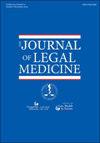The Trillion Dollar Revolution: How the Affordable Care Act Transformed Politics, Law, and Health Care in America
IF 0.8
4区 医学
Q3 LAW
引用次数: 3
Abstract
In the midst of an historic election, with the Supreme Court considering another existential challenge to the Affordable Care Act (ACA) and with the nation plunged into a public health and economic crisis from the 2020 coronavirus pandemic, the ACA is as important as ever. The ACA matters. It matters to many millions who count on its protections to access health coverage, particularly as they lose their job-based insurance in the pandemic. It matters to voters and to their representatives tasked with the next generation of health reform. It matters to states, the health care industry, and businesses who have sunk innumerable resources and time into making the ACA work. The Trillion Dollar Revolution assesses the ACA at 10 years, marking its achievements, trade-offs, shortfalls, impacts, and lessons for future reforms. The ACA was both monumental and paradoxical. It was the single biggest social welfare legislation enacted in 50 years and touched every aspect of our sprawling health care system. Yet the narrow political window for its passage meant that the ACA was incremental, building on, rather than fundamentally restructuring, our fragmented health care system. The ACA was imperfect because it inherited many flaws of the existing health care system. Nevertheless, the ACA achieved something quite revolutionary—it changed the minds of the American public, who have since embraced notions of health care access as a right and preexisting condition protections as a given. Edited by Ezekiel Emanuel and Abbe Gluck, the book reads like an insider’s account and assessment of the ACA. The contributors are a veritable Who’s Who of lawyers, health law scholars, health economists, health policy experts, and political leaders with a front-row view of the ACA. Divided into five parts, the essays discuss the ACA’s (I) policy goals, (II) implementation, (III) legal challenges, (IV) impacts, and (V) lessons for the future. The book is well suited for health law and policy students in college or graduatelevel courses, as well as for academics, journalists, health policymakers, and wonks. Fittingly, the book opens with a chapter by Timothy Stoltzfus Jost and John McDonough, perhaps the two most knowledgeable individuals in the country about the law and policy of the ACA. This chapter could stand by itself for its concise history of the ACA, what drove it, what it did, what worked, and what it did not do. Historians and policy scholars will appreciate the first-person accounts of the difficult trade-offs in passage and challenges of implementation by those who were in the room where it happened, including Kathleen Sebelius, who was the Secretary of Health & Human Services for the passage and implementation; Nancy-Ann DePearle, senior health policy advisor to President Obama; Peter Orszag, the director of the Office of《万亿美元革命:平价医疗法案如何改变美国的政治、法律和医疗保健》
在一场历史性的选举中,最高法院正在考虑对《平价医疗法案》(ACA)的又一次生死存亡的挑战,以及美国因2020年冠状病毒大流行而陷入公共卫生和经济危机,ACA与以往一样重要。ACA很重要。这对数百万依靠其保护获得医疗保险的人至关重要,特别是在大流行期间他们失去了以工作为基础的保险。这对选民和他们负责下一代医疗改革的代表很重要。这对各州、医疗保健行业和企业都很重要,他们已经投入了无数的资源和时间来实施《平价医疗法案》。《万亿美元革命》对ACA进行了10年的评估,对其成就、利弊、不足、影响和未来改革的教训进行了评估。ACA既具有里程碑意义,又自相矛盾。这是50年来颁布的最大的一项社会福利立法,触及了我们庞大的医疗体系的方方面面。然而,它通过的政治窗口很窄,这意味着ACA是渐进式的,是建立在我们支离破碎的医疗体系之上的,而不是从根本上重组。ACA并不完美,因为它继承了现有医疗体系的许多缺陷。尽管如此,《平价医疗法案》还是取得了一些革命性的成就——它改变了美国公众的观念,从那时起,他们就把获得医疗保健作为一种权利,把保护已存在的疾病作为一种既定的概念。这本书由伊曼纽尔(Ezekiel Emanuel)和格拉克(Abbe Gluck)编辑,读起来像是一位内部人士对ACA的描述和评估。这些撰稿人是名副其实的名人录,包括律师、卫生法学者、卫生经济学家、卫生政策专家和对ACA有第一手了解的政治领导人。文章分为五个部分,讨论ACA的(I)政策目标,(II)实施,(III)法律挑战,(IV)影响,以及(V)未来的教训。这本书是非常适合卫生法律和政策的学生在大学或研究生水平的课程,以及学者,记者,卫生政策制定者和工作。这本书恰当地以蒂莫西·斯托尔茨弗斯·约斯特和约翰·麦克多诺的一章开篇,他们也许是这个国家对《平价医疗法案》的法律和政策最了解的两个人。本章对ACA的历史进行了简明扼要的介绍,包括推动ACA的因素、它做了什么、什么起了作用、什么没有起作用。历史学家和政策学者将会欣赏那些当时在场的人对法案通过过程中的艰难权衡和实施过程中的挑战的第一人称描述,其中包括负责法案通过和实施的卫生与公众服务部部长凯瑟琳·西贝利厄斯(Kathleen Sebelius);奥巴马总统的高级卫生政策顾问Nancy-Ann DePearle;彼得·奥斯泽格是
本文章由计算机程序翻译,如有差异,请以英文原文为准。
求助全文
约1分钟内获得全文
求助全文
来源期刊

Journal of Legal Medicine
Multiple-
CiteScore
1.10
自引率
0.00%
发文量
3
期刊介绍:
The Journal of Legal Medicine is the official quarterly publication of the American College of Legal Medicine (ACLM). Incorporated in 1960, the ACLM has among its objectives the fostering and encouragement of research and study in the field of legal medicine. The Journal of Legal Medicine is internationally circulated and includes articles and commentaries on topics of interest in legal medicine, health law and policy, professional liability, hospital law, food and drug law, medical legal research and education, the history of legal medicine, and a broad range of other related topics. Book review essays, featuring leading contributions to the field, are included in each issue.
 求助内容:
求助内容: 应助结果提醒方式:
应助结果提醒方式:


